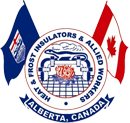On July 16, 2015 I was invited to meet with Alberta’s new Energy Minister Honourable Margaret McCuaig-Boyd with other members of the Alberta Energy Alliance.
With this short meeting we were able to promote mechanical insulation and the benefits that properly installed and maintained insulation systems can help industry across the province achieve new building initiatives and save energy.
Out of this meeting came an invitation to speak about mechanical insulation and give a trade perspective at the Buildings and Houses Session as part of the Government of Alberta’s Climate Change Advisory Panel. The focus of this meeting was more geared towards building envelops, increasing the R value for insulation in walls and making buildings better sealed. However I was able to make the point that there is a lot more to energy efficiency then just insulation in walls, and that a clear focus needs to be on mechanical systems and the efficiency of these system and how mechanical insulation properly installed, by training insulators such as the members of Local 110, will increase the overall energy efficiency of the building as much as 30% and the cost is usually recovered in energy savings.
Then on September 9, 2015 I was invited to be a presenter at the Pembina Institute Climate Summit. The main focus of this Summit was industrial projects. The focus of my presentation was that it has been found the optimal insulation for a 10 inch steam line at an operating temperature of 300 degrees celsius is 4 inch thick insulation. However at this time the majority of these installations are completed with 2 inch thick insulation and after 5 years 10 to 15% of mechanical insulation is missing or damaged in most plants. To insure full value of a mechanical insulation system, it has to be installed properly and be diligently maintained by trained and certified insulators.
Our message has been simple:
- Mechanical insulation can help Alberta industry achieve energy efficiency,
- Mechanical insulation is a viable for residential, commercial or industrial application,
- Mechanical insulation needs to be installed properly and maintained by trained and certified trades people,
- Mechanical insulation performance standards need to be established and include practices, materials and thicknesses,
